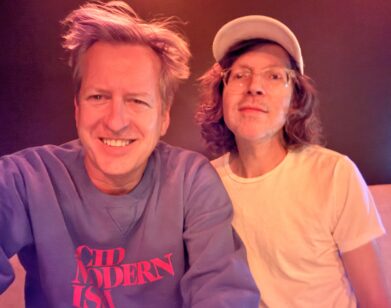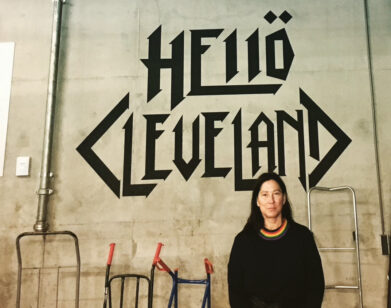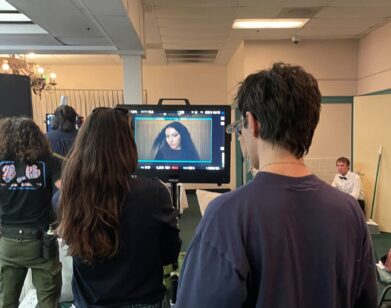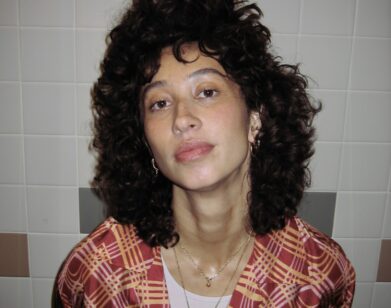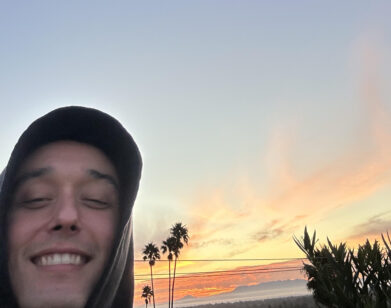Sinkane’s Martian Chronicles
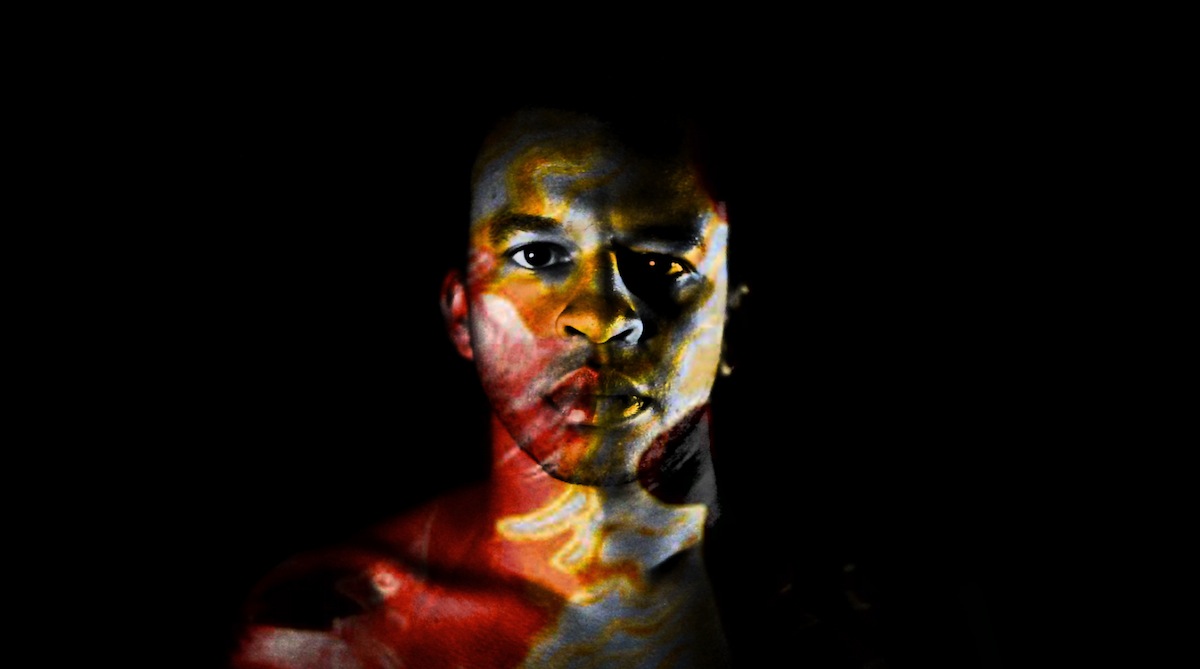
Sinkane’s latest album cover is deceptively sunny—a beachy iPhone vacation photo taken in Australia while on tour with Yeasayer, complete with bright blue skies and a carefree peace sign. The album’s title, Mars, gets at the existential stress that underlies the image: to hear his version of events, his last tour with the band thrust him into very unfamiliar territory. “I was all of a sudden a part of this music community that I only knew existed because of Pitchfork,” he remembers. Having previously performed and recorded with Caribou, Born Ruffians, and Of Montreal, Sinkane had spent several years in and around these circles, though mostly as a hired hand. But on Mars, he’s claiming his own place in the heavily Instagrammed world that is the Brooklyn music scene (as pictured, with a bright red and yellow flag, filter unknown).
The solo act of Ahmed Gallab, Sinkane has published off and on since 2007. He jokes that people probably know him as “the black guy” from the other acts he’s performed with in the years since, but he’s decided to focus wholly on his own music for a while. He’s gotten help from a few new friends in New York—Twin Shadow’s George Lewis, Yeasayer’s Ira Wolf Tuton, and Wild Belle’s Elliot Bergman all feature on the record—but the sound is decidedly his own mix of jazz, African percussion, and soft rock.
We caught up with Gallab at Café Collette in Williamsburg (“the best burger in the world,” he says) while he was on break from recording Sinkane’s next album. Our conversation touched on middle school rock bands, Star Wars, and the stress of collaborating on a solo project.
ZACK ETHEART: How did you end up in Brooklyn?
AHMED GALLAB: I came to Brooklyn kind of by default. I was paying with Of Montreal and the last show we played on that tour, or the last show I played with them, was on The David Letterman Show, and my sister was living here and I took a cab to her place and decided to stay. I didn’t really know anyone and it was about time to decide what I needed to do next, and that just seemed like the easiest thing to do. I was on tour for a while, so I didn’t really have a set place. I was sort of located in Athens, Georgia, but before that I was in Columbus, Ohio. That’s where I went to college.
ETHEART: I feel like there’s no better place to be a musician than in college.
GALLAB: Oh, yeah. I went to the University of Columbus and I got really into the DIY hardcore punk scene there, so I played in a few bands and I booked a lot of shows. I had a distro that got tabled. I was really, really involved. I worked for the student radio station and I booked the spring concert every year and I started booking shows all around the city. It was pretty awesome. It was great.
ETHEART: I heard you were in a band called Rigid Prawn in grade school. What was that like?
GALLAB: [laughs] Rigid Prawn… We changed our name a lot. The name that we stayed with was Present Tense, which you could argue is even worse. We were really big Pearl Jam fans, and it was really just a standard rock band. We did a lot of covers. We covered Live and Green Day and Pearl Jam. So it was kind of like this rock band, but there wasn’t really any sound to it. Our bassist was really into funk, so we slapped a lot. We all just wanted to have fun.
ETHEART: What other music did you grow up with?
GALLAB: I was a huge Radiohead freak, and I still am. I could tell you where I was for every release of every Radiohead record since The Bends. So that was a big one for me and it still is. I grew up listening to a lot of jazz with my dad. I am a huge, huge spiritual jazz fan. Pharoah Sanders and Alice Coltrane and Archie Schepp and Don Cherry—all that kind of jazz. Impulse! Records, that’s a huge one that’ll always stay. Spiritualized is one of my favorite bands. I’m very, very inspired by them. And there was a lot of African music. I don’t think there was a day in my life growing up that I didn’t hear some type of Sudanese song or some African or Middle Eastern music at home. I get inspired by a lot of things, and a lot of my friends would say that I just like everything. And there’s a lot of good in that, I think.
ETHEART: Do you think your Sudanese heritage factors into your music?
GALLAB: I find it very difficult not to write in any sort of Sudanese style. With Sudanese music, there are very specific things that happen with the syncopation of the drums, melodies and stuff. And whenever I write, that’s always the first thing that comes out, because I grew up listening to it. It’s a part of me, so I try to bring that out in the music. I think that you have to be honest with what you do, and that’s the most honest thing that I can do, is to write that way. You can hear that a lot in “Jeeper Creeper” and “Warm Spell.”
ETHEART: Do you think your solo stuff has been influenced over the years by whatever group you’re working with at the moment?
GALLAB: Oh, yeah. I learned so much from each of those opportunities. It was like going to college. I spent four years playing in other bands, and I got to see four bands work four different ways, and I think ultimately what I gathered out of it was how to be in a band, not necessarily the music. I got a lot of influence out of how they made music but not necessarily how they—I didn’t bring their music into mine. But I got to see how people deal with their business and how they work together, communicate with each other, how to construct a live band, and how to create a really good show. I made a conscious effort to not create music that sounded like the band I was playing in. I realized that it takes a lot of time to really create what you want, and you really have to think about it. What I wanted wasn’t necessarily what all these other bands had. But it was certainly inspiring to see them do and create and work very, very hard on their own visions, and to see their visions manifest into something greater than them.
ETHEART: Do you think collaboration is more work than writing or performing solo? Or does it help to split the workload with other people?
GALLAB: Hm, I don’t know. In my experience, working with other people like Yeasayer or Of Montreal or Caribou or Born Ruffians or anything, I was just a hired hand. I wasn’t really collaborating with them. I guess the live show was a collaborative effort. It was really easy for me to be a part of that environment, because all I had to do was what they wanted me to do. I didn’t have to invest myself too creatively into the project. Looking back on that, I really appreciated it. It was like having a job, and I really liked that. When you go into the whole realm of creating your own music and seeing the project through, it’s increasingly difficult because nowadays a lot of people are making music all on their own—the individual instead of the band. And when you have such a solid vision and you spend so much time working on one idea and allowing it to manifest in your mind through a record, and then you have to go and find people to help you see it through live, it gets really overwhelming, to have to project and really clearly state what you’re trying to do and how you want them to do it. I would say it’s much more difficult seeing your own idea through. That’s a huge task.
ETHEART: As for the people you’ve brought on to perform with you, do you think they’re there in the same “hired hand” capacity that you were for Yeasayer and Of Montreal? Or do you think it’s any more collaborative?
GALLAB: I don’t really know yet. We’ve haven’t even been a band for a year. What I know is that I want to maintain the role that I have in this band, and I want to be the band leader and I want to write the songs, but you never know how it’s gonna go. This is something that no one really talked about in the music industry, is that in the beginning it’s really, really difficult. Not because you’re struggling to play or something, but because you start getting the opportunity to do all these great things, but it’s not very easy because there isn’t very much money around. When you’re trying to make people believe in what you want to do, you have to be really careful to figure out how you’ll make it work, how to maintain the momentum that you’re getting without sacrificing much. It’s a complete learning process. I really like the guys that I’m playing with, I think they’re great, but we’ll just see where it goes. Hopefully it’ll manifest into something great.
ETHEART: What kind of party do you see your music being played at?
GALLAB: It looks like the Cantina Bar in Mos Eisley in Star Wars on a beach, like, a post-apocalyptic beach that’s totally decrepit and disgusting but beautiful at the same time.
ETHEART: Do you think moving to New York affected your sound at all?
GALLAB: Well, I started writing the album before I moved here. But I also remember just having a specific moment where I heard a bunch of music that related to in a way that I had never related to other music. Like, I heard a few African compilations and African bands from the ’70s, and realized that I saw myself in that in this very profound way, and I realized, “Okay, now I have a reference point for what I want to do.” I listened to my friend’s music, Helado Negro, Roberto Lange. He lives here, and right when I moved to New York and I was in this really crazy time where I didn’t know how to relate to anything and I didn’t really have any friends and I was in this foreign place. I felt like I was foreign, and I heard his music, and I talked to him, and it was the first time in New York that I realized that there are people like me. I’m not alone. And his music continues to inspire me and has allowed me to feel comfortable making music the way that I want to make it.
ETHEART: Are you ready to start touring again?
GALLAB: Yeah, I love touring. If I could tour every day of my life, I would. It’s my favorite thing to do.
ETHEART: That’s kind of rare, I think. A lot of people say it’s so physically and emotionally taxing.
GALLAB: It really is. I don’t know, maybe I’m just a freak of nature, but I like every aspect of it. I like it when you play amazing shows and everyone’s in high spirits, I like hating everything and wanting to be alone, I like the days that are boring and there’s nothing to do, I love the time wasted. I love everything about it.
ETHEART: So you really do like everything.
GALLAB: Well, I don’t like the snow.
SINKANE IS PERFORMING AT MIDNIGHT TONIGHT AT THE BLUE NOTE. FOR MORE ON THE ARTIST, VISIT HIS WEBSITE.


